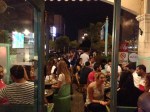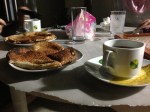A friend of mine was sitting in a restaurant in Tripoli, waiting for the Iftar. At the first day of Ramadan, Iftar is a big deal. It had been a very tough day of fasting in the scorching July heat. The restaurant he was sitting in was abuzz with talks about a little girl named Jana. Everyone wanted to make sure she was doing well, that she was eating, that she was well-seated, that she was well-taken care of.
My friend, who wasn’t from Tripoli and was visiting the city oh so cautiously, was intrigued. He started asking who Jana was. She was the homeless girl selling flowers to the people having Iftar on the first day of Ramadan. As he told me the story, not knowing whether it was true or not, I decided that I must try and live – to the best of my capacities – parts of Ramadan in Tripoli.
My best friend being from the city made this quite easy. Soon enough, his mother was asking when I’d come visit. I very gladly obliged. So on a Saturday of Ramadan, I was standing at the doorstep of one of the kindest and most hospitable people I know, breathless as I was racing against a sinking sun, worried I wouldn’t be there on time. We sat on a breezy balcony that overlook a desolate street.
Tripoli might as well have been a ghost town at that point. Everyone was busy eating. I was served some soup, followed by fattouch then some mloukhiye the likes of which I had never had before. I daresay the food passed by quite fast for what I had in mind but I didn’t mind. The mloukhiye was coupled with some rice and chicken and other Lebanese mezze items. Soon enough, we found ourselves drinking jallab and other kinds of juices while the smokers puffed on that cigarette that had been sitting in their pockets waiting for such a long time. The chit chats grew louder. The conversations veered toward the medical as my med student status was revealed. The women started asking me questions about C-sections and normal deliveries. Cake was served. I didn’t feel like an outsider at all. In fact, I might as well have been part of the family, all to the backdrop of the tarawih chants emanating from the many minarets surrounding us.
A few minutes later, I found myself at the footsteps of a shabby bakery that did what I was told was incredible nammoura. “How much is the kilo for?” I asked. “6000LL,” the old man replied. He then took a sealed box, weighed it, looked at me and smiled: “It’s 1.5 kilos, but it’s okay – 6000LL it is. Have you tried the coconut-based pastry?” I shook my head. So the next thing he did was take one that was freshly baked, handing it to me to taste. I tried to decline. He wouldn’t take no for an answer. I smiled as my teeth sank into it, taking pictures of the place in the process while one of the employees pointed out to things I should include in my frames.
After buying enough sweets to last our household a month, we walked around the busier streets of the city towards my favorite cafe, Ahwak. The place was unusually empty. We ordered some oreo cheesecake and carrot cake while we forcibly listened in to the conversations taking place around us. Two guys were discussing politics fervently, which is quite normal for a city whose entire current strife is based in those politics. Two girls were discussing keeping their figure with Ramadan fasting. We spoke about how things could have been in the city, in the country. Nothing like demotivating conversations to take you through the night, which was ironic given that the cafe we were in was pillaged a few days earlier by Islamists who accused its owners of serving alcohol. Then we saw her, a little blond girl in a blue dress, holding flowers in her hand.
A couple of friends then decided they were craving some Hallab sweets. So we walked to where Hallab originated, the only place where I find you can get the authentic experience of those Arabian sweets. We don’t take any of those Jounieh wannabe franchise places and their ad wars. The place was busy as well, though nowhere near as busy as in years past. Those friends had some ice cream and mafrouke.
The clock was ticking the night away as we made our way to Azmi street. I was told about its shops opening way past midnight to allow the city’s residents to buy all their Eid’s new clothes and gifts. As we got closer, the music grew louder. I jokingly said this was obviously emanating from a convertible 1980s BMW. I wasn’t mistaken. After all, who else would blast some horrible Arabic music at near 2AM?
The shops were open but mostly empty. The streets were stuck between wanting to be lively and succumbing to the reality of a city that is coming to terms with how economically dead it’s being forced to become.
“I expected more,” I told my friend as we walked past the coffee sellers, clinking their cups to attract those passing, and impromptu stands selling cheese kaaks hoping the smell of their sandwiches would bring in some hungry people in for an early Sohoor.
“I expected the same,” he replied. “But I guess this is what happens when a city has had the year Tripoli had.”
We made our way up the street, wondering what to do next. It was around 2:30AM and nearing the Sohoor time for the city’s residents. “Do you wanna go to Bab el Ramel for a typical Sohoor setting?”
I shook my head. My circadian clock was nowhere near equipped for the rhythm Ramadan required. I was getting tired. So we returned to my friend’s house where we saw his mother sitting on the veranda, quietly looking over the city as she was waiting for dawn to break.
As she offered us tea to get time to pass, we told her about how Azmi street was much different than the year before, how Ahwak had much less people than when we went last, how it didn’t really feel like Eid was approaching, only eleven or twelve days away. So she told us about the city she once lived in, where she had a Christian friend who used to be closer than a sister to her. We spoke about how things changed from my mother being able to go to Bab el Tebbane alone a couple of years ago to how the city feels today. We spoke about the politicians of the city who couldn’t care less. We spoke about the Syrian civil war/revolution whose hold on the city seems won’t know an end. She told us about how she fears the Islamists ruining her city more than everyone else. She told us how she is considered a kuffar because she’s one of the many who don’t agree with what they do. She told us how she is ashamed of the reputation they have forced on her and her family and the people she holds dear. She told us how she is worried about the future of her children in the city she can barely recognize. We spoke about life in general, our families, our aspirations, our hopes for the future.
It was then that we heard a faint explosion sound. I looked around, intrigued. “Don’t worry, they said. It’s the madfa3 announcing dawn getting nearer.” A few minutes later, an ominous voice rang across the city to tell the people to stop drinking water. Soon after that, the minarets started chanting again.
“Here we go again,” she said before going up to her feet to go to bed. “Do visit again, okay?”
I nodded. It was the first time I attended all Ramadan-related proceedings. We talk about how we are a country of coexistence and whatnot, but how many of us have truly attended another person’s religion-related practices? Almost no one. “I would love to,” I replied as the first streaks of sunlight slithered over the concrete walls.











so… this article started with a little girl named Jana, and she was breifly mentioned in it again. the article then drifted to a love affair with food. care to explain ?
LikeLike
where is the picture of the little girl? we needed to know more about her!!!
LikeLike
The mention of Jana told me of concerned citizens for her well being, that she was part of the community. Not speaking more of her here didn’t deviate from the title of the article.
LikeLike
Pingback: A Love Story From The War-Torn Rooftops of Tripoli To Lebanon | A Separate State of Mind | A Lebanese Blog